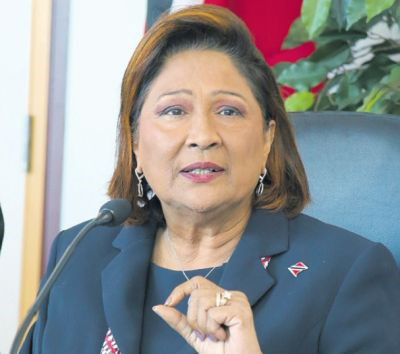Proper legislative framework to cover the oil and gas sector is essential to ensure that multinationals contribute adequately to the development of Guyana even as they invest and benefit by finding and producing oil, Trinidad and Tobago’s Leader of the Opposition Kamla Persad-Bissessar says.
“You don’t want to end up in a different kind of slavery,” she said.
“Sugar was king and they took the sugar from us. We were colonised- slaves and indentures. They took our sugar and our chocolate, manufactured them and sold them back to us. Don’t let that happen with your oil and gas.”
Addressing manufacturers and other invitees on Thursday evening at the Guyana Manufacturing and Services Association’s annual awards at the Pegasus Hotel, in Kingston, Georgetown, Persad-Bissessar said Guyana will need the foreign investment but it also needs the local content which must be protected.
Sharing Trinidad and Tobago’s experiences and lessons learned in managing its oil and gas revenues, she said, initially everything in the oil and gas sector was foreign-owned, then state-owned and government-controlled, but because of mismanagement Trinidad and Tobago is currently returning to putting the sector back into the hands of foreigners.
With T&T exporting crude, she said, “We now have to buy the things that NP (National Petroleum) was producing, the oil and the lubricants. We have to import them. Don’t let that happen to you. In manufacturing of petrochemicals, get involved in the downstream industries. It is a great place you can get involved. Set up your own manufacturing in the energy sector and continuing with other manufacturing.”
She added, “Do not put all your eggs in the one basket of black gold.”
In negotiations, she said, it was important that Guyana gets the best deals possible and that its negotiators be among the best and highly specialised in their fields of expertise.
“Get the young ones trained—your own local content to be trained,” she said.
The University of the West Indies (UWI), listed by the World University Rankings as being in the top five per cent of universities in the world, she said, is already preparing the regional society for a sustainable growth future by offering the level of insight and management required for strong and potent decision making.
While UWI offers bachelor’s and master’s degree programmes in energy management and resource development among business management programmes, she said, the University of Trinidad and Tobago (UTT), offers significant training in vocational programmes allied to the petroleum sector. There is also a drilling academy at UTT.
“These are opportunities close to home which Guyana may very well consider as you invest in the best in class to train your own workforce,” she said.
Procurement transparency
Noting that negotiations on pricing are highly complex and controversial, she said, in today’s world of tedious litigation, research and preparation on these issues must be foremost in the minds of legislators and negotiators as one does not often get the opportunity to return to a bargaining table when the ink dries on the contracts.
At the heart of these negotiations, she said, must be that Guyana must always get the best deals for its patrimony from the oil and gas and its other resources.
“I have long held the view that the assets of the state belong in equal measure to every citizen, and in this regard, I have always advocated that the procurement of assets of the state as well as the disposal of assets must conform to the most stringent standards of compliancy and in the most transparent manner as possible,” she noted.
Leaders and key stakeholders in the emerging oil and gas industries, Persad-Bissessar said, need to hold government accountable to the highest standards for the care of the lands and assets of the state.
The key to this, she said, is the establishment of an Office of Procurement, which is completely independent of political interference.
Currently in T&T, she said, “there are serious concerns about the disposal of the billions of dollars of Petrotrin’s (Petroleum Company of Trinidad and Tobago) assets, because government has failed to proclaim our procurement legislation and so far fail to empower the Office of the Procurement Regulator.”
The lessons of the recent flooding disaster in T&T, she said, “have brought out in the wash, allegations of corruption involving former and current ministers.”
This involved the settlement of hundreds of citizens in a state housing development which was built without building and safety approvals and without any transparent procurement process, she said. “I cannot stress enough the critical need for proper procurement practices to be enacted in your country,” she said, before adding “With people coming to invest in Guyana, not a contract should be granted without proper procurement and transparency taking place.”
Every time government has to give out contracts there has to be a process, she said, “It must not be about friends and family. It must be done through a transparent process. Too often you hear about politicians giving to family and friends.”
“When contracts are to be awarded and many will be awarded when you go into these new ventures,” she said, “you will need proper procurement legislation.”
Laws to govern disposal of assets, she added, could be done in the same statute as procurement.






